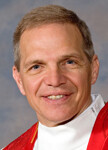
Honoring Mission Leaders
 BY BISHOP JOHN R. SCHOL
BY BISHOP JOHN R. SCHOL Wesley Theological Seminary recently honored the brothers Bishop James and Dr. Joseph Mathews with a symposium to mark the dedication of a new archival center at the seminary.
These two men, who served with such faithfulness in our region and across the world, provide us with a road map for disciple-making, mission-minded leadership.
In their work in making the Kingdom of God a reality, the pair embraced common principles that guided them. These included the development of the whole person, cultural competence, and an inquisitive mind.
These three principles can also assist spiritual leaders today.
It is essential for us within the church to take on broad systemic social issues and, at the same time, focus on the personal spiritual needs of each person we encounter. It's also important when doing culturally competent mission to acknowledge and build on the gifts and assets of the people where the mission is being lived out.
Perhaps more than any other trait, the Matthews brothers were noted for their inquisitive minds. Anyone who has known them, knows this first-hand.
When I meet Bishop Mathews, he wants to know what I am up to and what is happening not only in the Baltimore-Washington Conference but around the world.
One of the reasons the church has lost its power to transform is because it has lost its inquisitiveness. It stopped asking good questions and instead became the dispenser of answers. It stopped learning about current and future realities and asking, "what if," but instead lived out of what it knew and the answers it had.
Reading, learning, listening and wondering are the keys to future mission.
As Joe Mathews taught, we need to look at an issue through factual, emotional, rational, and action-oriented questions, developmental and educational aspects of mission.
Once while working with a group of church and community leaders in the Kensington section of Philadelphia, I asked, what are the assets of this community?
I felt embarrassed asking the question. After all, the church we were sitting in had a leaky roof, outside its doors were young people selling and using crack and the church sat on a corner of a block that looked like bombed out Iraq with boarded up and dilapidated homes in a community where all the businesses, banks, supermarkets and corner delis had left town.
Assets? I was afraid they would send me packing. But we always began helping churches start a Community of Shalom by asking, "Tell us about the assets of this church and
community. "
I received an education. The group came up with two pages of assets. These assets became the building blocks for starting a new worship service, a new business and an effort to renew the spirit of the people and the community. Through a process of inquisitiveness, of inquiry, a group of people felt empowered to be in mission.
So today we ask for the future mission of the church, where is the inquisitiveness of the church that proclaims the Gospel through holistic development and cultural competence?

Login/Register to leave comment